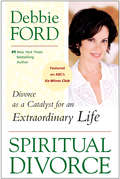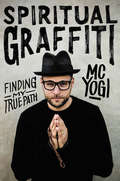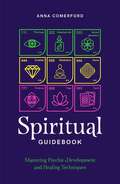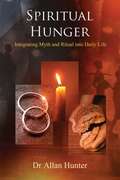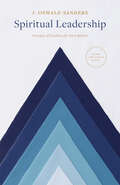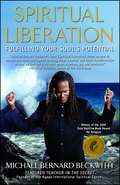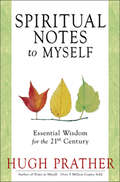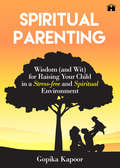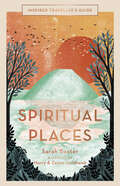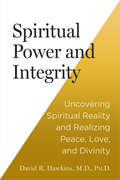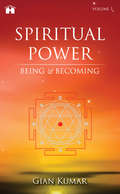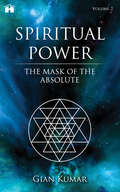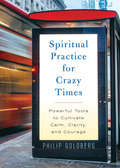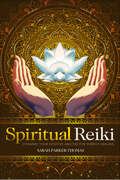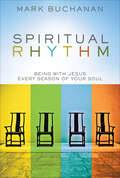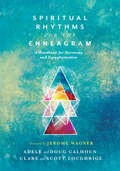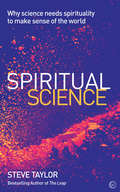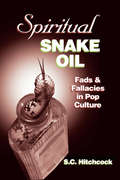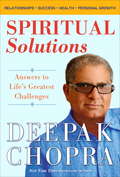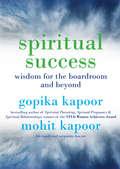- Table View
- List View
Spiritual Divorce
by Debbie FordCould the end of your marriage be the first step toward reclaiming your personal power and joyfully living the life of your dreams? If the answer is yes, this book is for you. Divorce rocks the very foundation of our beings, leaving us feeling lonely, flawed, enraged, undesirable, hopeless, and empty. In Spiritual Divorce, New York Times bestselling author Debbie Ford reveals how this devastation can be transformed into a profoundly enlightening experience. This empowering guide shows how the collapse of a marriage is, at root, a spiritual wake-up call, an opportunity to liberate ourselves and reclaim our lives. The end of a relationship-no matter who ends it-is a damaging moment. Ford offers a clear program for turning ruin into renewal.
Spiritual Divorce
by Debbie FordCould the end of your marriage be the first step toward reclaiming your personal power and joyfully living the life of your dreams? If the answer is yes, this book is for you.Divorce rocks the very foundation of our beings, leaving us feeling lonely, flawed, enraged, undesirable, hopeless, and empty. In Spiritual Divorce, New York Times bestselling author Debbie Ford reveals how this devastation can be transformed into a profoundly enlightening experience. This empowering guide shows how the collapse of a marriage is, at root, a spiritual wake-up call, an opportunity to liberate ourselves and reclaim our lives. The end of a relationship--no matter who ends it--is a damaging moment. Ford offers a clear program for turning ruin into renewal.
Spiritual Graffiti: Finding My True Path
by Mc YogiBefore he was one of the most well-known yoga teachers in North America and an international hip hop artist, MC YOGI was a juvenile delinquent who was kicked out of three schools, sent to live at a group home for at-risk youth, arrested for vandalism, and caught up in a world of drugs, chaos and carelessness. At eighteen, fate brought him to his first yoga class. After discovering yoga, MC YOGI devoted himself to the practice. From traveling to India to study with gurus to living and learning with many American yoga masters, MC YOGI soaked in the knowledge that would revolutionize his entire life and put him on the path to healing, wholeness, and peace. Through technicolor stories of graffiti and guns, mystics and musicians, love, loss, and finding his soul’s purpose, MC YOGI’s journey is saturated in spiritual wisdom, illuminating the potential for transformation within us all.
Spiritual Guidebook: Mastering Psychic Development And Healing Techniques
by Anna ComerfordA comprehensive guide to understanding and mastering healing and psychic techniques. Tap into your intuition, heart and soul and be amazed at how your skills unfold and develop in surprising ways.The Spiritual Guidebook includes information about opening the third eye, chakras, tarot, mediumship, crystals, reiki, healing, meditation, channelling, automatic writing, auras, scrying, psychometry, energy, essential oils, yoga, guides, shamanism, numerology, health, quantum physics, sacred geometry, self-hypnosis, mind power, past lives and spirit releasement. Written by Anna Comerford, an award-winning Australian psychic the Spiritual Guidebook will expand your psychic knowledge and intuitive-healing abilities in ways you never imagined.
Spiritual Hunger
by Allan HunterFrom daily activities such as work and eating to milestones such as graduation and marriage, this discussion debates the myths that guide lifestyles and questions why they exist in the first place. Each belief is broken down and examined in terms of how it works, exposing its true nature so that its value and necessity in culture as well as the way it operates can be determined. This unique self-help guide demonstrates how to reinvent old, outdated rituals; get rid of those rites that are entirely ineffective; and create new habits that provide a deeper meaning to everyday life. A gateway to finding a better understanding of what contributes to healthier relationships, this guide to rituals paves the way to sustaining a fulfilling and happy life.
Spiritual Leadership: Principles of Excellence for Every Believer (Sanders Spiritual Growth Series)
by J. Oswald SandersOver 1 million copies soldWhat every church will always needThe need for talented, vigorous leaders in the church cannot be overemphasized. Such times demand active service of men and women who are guided by and devoted to Jesus Christ.With more than 1 million copies sold, Spiritual Leadership stands as a proven classic for developing such leadership. J. Oswald Sanders, a Christian leader for nearly seventy years and author of more than forty books, presents the key principles of leadership in both the temporal and spiritual realms. He illustrates his points with examples from Scripture and biographies of eminent men of God, such as Moses, Nehemiah, the apostle Paul, David Livingstone, Charles Spurgeon, and others. Featured topics include:The cost of leadership The responsibility of leadership Tests of leadership The qualities and criteria of leadership The art of reproducing leaders The one indispensable requirement of leadershipSanders holds that even natural leadership qualities are God-given, and their true effectiveness can only be reached when they are used to the glory of God. Let this classic be your guide for leadership, and watch how God works through you to do great things for His glory.
Spiritual Leadership: Principles of Excellence for Every Believer (Sanders Spiritual Growth Series)
by J. Oswald SandersOver 1 million copies soldWhat every church will always needThe need for talented, vigorous leaders in the church cannot be overemphasized. Such times demand active service of men and women who are guided by and devoted to Jesus Christ.With more than 1 million copies sold, Spiritual Leadership stands as a proven classic for developing such leadership. J. Oswald Sanders, a Christian leader for nearly seventy years and author of more than forty books, presents the key principles of leadership in both the temporal and spiritual realms. He illustrates his points with examples from Scripture and biographies of eminent men of God, such as Moses, Nehemiah, the apostle Paul, David Livingstone, Charles Spurgeon, and others. Featured topics include:The cost of leadership The responsibility of leadership Tests of leadership The qualities and criteria of leadership The art of reproducing leaders The one indispensable requirement of leadershipSanders holds that even natural leadership qualities are God-given, and their true effectiveness can only be reached when they are used to the glory of God. Let this classic be your guide for leadership, and watch how God works through you to do great things for His glory.
Spiritual Liberation: Fulfilling Your Soul's Potential
by Michael Bernard BeckwithWhat would we do if we truly understood the power we have within ourselves, the perfection of our inner being, and the transformation that awaits us? In this handbook for spiritual revolutionaries, Michael Bernard Beckwith challenges readers to search within for the key to unlock their future, preparing them for the great transformation that is theirs to experience.Beckwith is a renowned interfaith minister, crusader for peace and nonviolence, and respected teacher and community leader based out of Los Angeles, California. In his first full-length book, he shares the wisdom from the past, coupled with the revelations of the present, in a powerful, life-changing way. Moving beyond mere theory or rhetoric, the book engages the reader on a personal level, challenging them to take the next step towards transforming their lives in every way. Beckwith believes that people who cultivate their full potential spiritually, mentally, emotionally, professionally and creatively not only experience a more meaningful personal life, they contribute to the development of society that recognizes, honors and nurtures the dignity of the world's peoples. This book offers practical wisdom and practices for redefining and revitalizing the very foundations of life, thus leading to fulfillment and success for individuals and the global society in which we live.Each chapter is filled with insight into the divine blessings that all have been given. The book will show the reader that they are on their way to an amazing spiritual adventure. The book is structured around several core themes, which include: transformation; peace; abundance; and the habits of highly evolved people.
Spiritual Notes to Myself
by Hugh Prather"I write this book because I assume that you, like me, now feel a yearning for a simpler life and for relationships that last. There is unquestionably a way for you to have the life you long for. I now know this beyond any doubt. Clearly an ego is not all we are. Nor is the ego's puny range of experience all we believe in. Most individuals have had at least a moment when they felt joined with something greater than themselves. Perhaps they felt swept up in the strains of extraordinary music, or felt utter stillness before the magnificence of nature. Perhaps they experienced an instant of perfect love for a child or an animal and the joy they felt was beyond human description. Perhaps they sensed the existence of an order or a perfection and suddenly they knew that it included everything and everyone. Maybe there was no outward evidence of this perfection or order, but they had a deep knowing nonetheless. Others have felt the touch of God's peace at the very moment of tragedy or loss. Here the evidence before their eyes refuted what they felt, but somehow they sensed the unshakable grounds for that peace. As the old hymn says, "My God is real... 'cause I can feel ... Him in my soul." That experience is undeniable. It is more powerful and intimate than anything in the world. Just one instant of the knowledge of God destroys even the laws of physics. It brushes aside time and space. It brushes aside death. For within the peace of God we can feel the presence of a loved one who may be continents away, or that someone who has died and no longer "exists" in the world in any meaning' ful sense is now with us, a living presence we cannot lose." Other books by Hugh Prather are available from Bookshare.
Spiritual Notes to Myself: Essential Wisdom for the 21st Century
by Hugh PratherA Guide to Deeper SpiritualityA follow-up to the classic, Notes to Myself. As an author, minister, and counselor, Hugh Prather had extensive experience sharing wisdom on worldly (and other-worldly) topics. His book, Notes to Myself, offers a treasury of thoughtful and eye-opening insights and reminders. And this spiritual-themed follow-up book masterfully accomplishes the same goal of guiding readers to greater awareness.A modern Book of Proverbs. Throughout the book, Prather offers countless tidbits of wisdom. Each line is packed with powerful insight and inspiration that is sure to leave a lasting impact on readers. Though his words are written as “notes-to-self,” Prather’s gaze looks to and reflects on the outside world, and so he draws us all into his thoughts. Through this inner dialogue, we see the world more clearly.Essential guide for your spiritual journey. Journeys are made easier when we have a guide. This book fills that role for readers on their own journey toward spirituality. Spiritual growth can be a slow but rewarding process if we devote the time to it. Prather’s words throughout this spiritual book remind us that we are not alone on our journey, and that it is through realizing our oneness with all living things that we find our way.Check out Spiritual Notes to Myself, one of Hugh Prather’s classics, and find…A simple, easy-to-read guide for greater spiritual and self-awarenessPowerful words of wisdom on each pageA resource to return to again and again in your spiritual journeyReaders of books such as A Path with Heart, Life of the Beloved, Beholding and Becoming, and Awareness: The Perils and Opportunities of Realitywill enjoy Hugh Prather’s Spiritual Notes to Myself.
Spiritual Parenting
by Gopika KapoorA child is possibly life’s greatest miracle; raising one is possibly life’s greatest challenge. But fear not – help is at hand! In this indispensable guide, Goplika Kapoor, a writer and mother of twins, shares with you all that she has learned both as a parent herself and as a close observer of other parents. From managing your toddler’s tantrums to advice on kiddie birthday parties, and from suggestions on positive discipline to ideas on how to connect with your child, she provides not just solutions, but also useful tips on pre-empting the common problems that every parent encounters in bringing up Baby. However, this book is much more than primer on how to raise happy kids; it is also about how to be happy parents. In her typically reassuring, compassionate tone, she shows us how to tackle the physical and emotional difficulties we face as parenting adults – post-partum depression, sleeplessness, strains on spousal relationships, and much more – with suggestions for body and soul based on practical experience and spiritual lessons. Focused on both parent and child, Spiritual Parenting is an invaluable compendium of common sense and spiritual wisdom. Read this book and you’ll see how one of life’s greatest challenges can also be one of its greatest joy…
Spiritual Perspectives and Human Facts: A New Translation with Selected Letters
by Frithjof SchuonThis new edition of Frithjof Schuon''s Spiritual Perspectives and Human Facts is a fully revised translation of the French edition, and has an extensive Appendix containing previously unpublished letters and other private writings.
Spiritual Places (Inspired Traveller's Guides #1)
by Sarah BaxterFrom the natural splendour of Devils Tower in Wyoming, to the medieval pilgrimage of Camino de Santiago that stretches to Spain, Inspired Traveller's Guides: Spiritual Places explores locations that will be a balm to the mind and a tonic to the soul. Travel journalist Sarah Baxter has carefully curated a selection of the 25 most spiritual destinations from around the world – places that hold the promise of rare and profound experiences, whether areas of natural beauty imbued with spiritual significance or sites constructed for worship. From breathtaking scenery to religious capitals, sacred valleys to places of natural beauty, here the full spiritual story and unique tranquillity of each place is revealed with beautiful hand-drawn illustrations and evocative tales of previous visitors that will both delight and inspire.Featured locations: Crater Lake, Oregon, USA; Mauna Kea, Hawaii, USA; Devils Tower, Wyoming, USA; Haida Gwai, Canada; Teotihuacan, Mexico; Lake Titicaca, Bolivia and Peru; Easter Island, Chile; St Catherine's Monastery, Egypt; Kyoto, Japan; Shwedagon Pagoda, Myanmar; Adam's Peak, Sri Lanka; Varanasi and the Ganges, India; Mount Kailash, China; Cape Reinga, New Zealand; Uluru, Australia; Saut d'Eau waterfall, Haiti; Camino de Santiago, Spain; Mezquita de Cordoba, Spain; Isle of Iona, Scotland; Avebury, England; Mont St-Michel, France; Lourdes, France; Luther Trail and Wittenburg Cathedral, Germany; Mount Olympus, Greece; Temple Mount and Jerusalem, Israel. Perfect for those who want to get away from it all, this book takes you closer to these sacred locations than ever before. Each book in the Inspired Traveller's Guides series offers readers a fascinating, informative and charmingly illustrated guide to must-visit destinations round the globe. Also from this series, explore intriguing: Artistic Places (March 2021), Literary Places, Hidden Places and Mystical Places.
Spiritual Power and Integrity: Uncovering Spiritual Reality and Realizing Peace, Love, and Divinity
by David R. Hawkins MD/PHDIn this lecture series, acclaimed teacher Dr. David R. Hawkins explains how we can transcend lower levels of consciousness and experience the highest levels in the Map of Consciousness®.How do we go from the 400s to the 500s? Theology, philosophy, and epistemology will lead us up to the doorway but cannot lead us through the doorway. &“The way out of the box&” is through Love, Joy, Peace, Beauty, Consideration, Devotion, and the reverence for Truth, which is the appreciation of all that is sacred.In this book, Dr. David Hawkins goes on to explore how everything is happening spontaneously and that nothing is causing anything. He then talks about content and how it relates to context and how to love your humanness.Some of the many topics discussed include:Transcending duality, no-mind, silence, Asking &“Who am I?&” vs. &“What am I?&”Stillness, letting go, aligning with integrity, and dissolving content into contextLoving your animal natureThe concept of &“happening&” being illusoryAnd much more!
Spiritual Power: Being & Becoming - Volume 1
by Gian KumarAn insightful, informative and definitive work that projects spirituality in a new light and reveals how it can transform us and bring peace and happiness all around. In this compact volume, Gian Kumar, a thinker by nature, provides a comprehensive overview of the seemingly mysterious, yet accessible, world of spirituality. Those seriously seeking to understand spirituality and its myriad aspects will find answers to questions they have been pondering over for years, such as: Is God only in the mind? Is reality the same for all of us? How do we go beyond the limitations of the body and the mind to attain a higher plane of consciousness and awareness? What is self-realization? What kind of entity is the soul? The author defines spiritual power as ‘that inner awareness and the capability to awaken our mind from the ignorance that we are not solely body and mind, but something more’. He goes to explain in detail that ‘something more’. The author contends that acquiring spiritual bliss may not be within everybody’s reach, but those who are keen and sincere can achieve this objective by delving deep into their inner selves to find out their shortcomings and how to overcome them so that they can lead complete and wholesome lives.
Spiritual Power: The Mask of the Absolute - Volume 2
by Gian Kumar‘What we achieve inwardly will change outer reality.’— PlutarchIn this compact volume, Gian Kumar, a thinker by nature, has delved into the essence of spirituality, and its relationship with every aspect of human existence. When we cease to blame destiny for every mishap occurring in our lives and instead seek answers from within, we will be on the path to illumination and awareness. Gian Kumar has put this wisdom to the test innumerable times in his life. His own struggles strengthened his resolve to fight life’s battles from his inner resources rather than look outward. He shares his insights with us, offering some new revelations each time. He reiterates that spiritualism is purely based on the theory that ‘all that exists is one and not two.’ We are here to experience this oneness, with the realization that we are all interconnected and interrelated and simply cannot exist on our own.This volume should be used as an advanced guide to help us discover the inner path of spirituality, and how to live complete, fulfilling lives.
Spiritual Practice for Crazy Times: Powerful Tools to Cultivate Calm, Clarity, and Courage
by Philip GoldbergA practical guide to surviving and thriving in a world gone madDo you ever feel torn between finding refuge and staying informed and engaged? Have you ever felt too stressed out to meditate? Too anxious to roll out your yoga mat or pray? The truth is, when the world gets chaotic and confounding, we need spiritual practice more than ever. That's when our souls need sustenance the most. That's when we really need to recharge and ground ourselves to take on the challenge. This concise, compassionate guide will help you access the silent sanctuary within you. It's filled with practical tools that provide spiritual support at a moment's notice, in whatever time you have, with whatever attention you can spare. Expert teacher Philip Goldberg draws on authoritative texts and masters from every spiritual path, especially the empirical methods of the Yoga tradition--as well as contemporary psychology, scientific research, and decades of interviews and personal experience. The result is a wide range of techniques to relieve the mind and body, refresh the spirit, and gird you for constructive action. You'll get insightful instruction in practices ranging from deep meditation to cognitive reframing to "spiritual space management," from silently communing with nature to actively engaging with spiritual companions. And you'll find detailed guidelines for creating a regular practice routine--along with an inventory of supplementary methods--that suits your personal needs and lifestyle. This breezy, thorough, pragmatic book will help you find refuge and healing from the crazy times we're living in--and it will prepare you for taking robust steps to help restore sanity in the world around you.
Spiritual Reiki: Channel Your Intuitive Abilities for Energy Healing
by Sarah Parker ThomasAwaken your spiritual gifts with the healing power of ReikiReiki can be a profoundly spiritual avenue for channeling powerful, healing life force energy—it's also unlike any other healing modality. Spiritual Reiki is the guide to deepening your mystical connection, accessing your psychic gifts, and tapping into the mysterious divine to more deeply experience this ancient energy healing practice.This is the perfect resource for practitioners who seek to heal at the deepest levels. Find direction to help you open up to spiritual experiences and discover your own personal healing abilities. Whether you're looking to connect to a higher realm, hold your vibrational energy longer, or simply tune into your intuitive abilities more deeply, Spiritual Reiki is your manual for this transformative process.Inside this book you'll find:Third eye open—Learn to grow spiritual abilities like clairvoyance and clairaudience to gain insight into visions, dreams, and other divine communications.Spiritual enhancement—Tips help you integrate other holistic, healing practices like witchcraft, yoga, and crystals with Reiki to deepen your intuitive and psychic abilities.Healing sequences—With 65 different Reiki sequences to promote spiritual awakening and emotional healing, you'll find the right one for any situation.Learn to access the mystical and spiritual healing life force of Reiki for an even more profound experience.
Spiritual Rhythm: Being with Jesus Every Season of Your Soul
by Mark Buchanan"Abide in me," Jesus tells us, "and you will bear much fruit." Yet too often we forget that fruit needs different seasons in order to grow. We measure our spiritual maturity by how much we do rather than how we are responding to our current spiritual season.In Spiritual Rhythm, Mark Buchanan replaces our spirituality of busyness with a spirituality of abiding. Sometimes we are busy, sometimes still, sometimes pushing with all we've got, sometimes waiting. This model of the spiritual life measures and produces growth by asking: Are we living in rhythm with the season we are in?With the lyrical writing for which he is known, Mark invites us to respond to every season of the heart, whether we are flourishing and fruitful, stark and dismal, or cool and windy. In comparing spiritual rhythms to the seasons of the year, he shows us what to expect from each season and how embracing the seasons causes our spiritual lives to prosper. As he draws on the powerful words of Scripture, Mark explores what activities are suitable or necessary in each season--and what activities are useless or even harmful in that season.Throughout the book, Mark weaves together stories of young and old, men and women, families, couples, and individuals who are in or have been through a particular season of the heart. As Mark writes, "I pray that this book meets you in whatever season you're in, and prepares you for whatever seasons await. I pray that it helps you find your voice, your stride, your rhythm, in season or out. Mostly, I pray that you, with or without my help, find Christ wherever you are. And that, even more, you discover that wherever you are, he's found you."
Spiritual Rhythms for the Enneagram: A Handbook for Harmony and Transformation
by Adele Ahlberg Calhoun Doug Calhoun Clare Loughrige Scott Loughrige Jerome WagnerThe Enneagram opens a remarkable window into the truth about us, enabling us to see how image, wounds, lies, triggers, and default responses shape us every bit as much as our faith. But simply diagnosing our number doesn't do justice to who we are. Nor does it necessarily change us or our relationships. Transformation happens as we grow in awareness and learn how to engage and reflect God's image. And relational repair then results as we apply Enneagram insights to the rhythms and grooves of our ordinary daily lives. For those who have learned about the Enneagram and wonder "What's next?"—this handbook is the answer. Filled with exercises to engage, challenge, encourage, and sustain, Spiritual Rhythms for the Enneagram will help us grow in greater awareness and lead us to spiritual and relational transformation. Including new insight on the Enneagram and the Harmony Triads, and offering helpful "Soul Resources" in the appendix, this handbook can be used by individuals or groups.
Spiritual Science: Why Science Needs Spirituality to Make Sense of the World
by Steve TaylorIt is often assumed that there are two ways of interpreting the world: a rational scientific way, or an irrational religious way. Spiritual Science offers a third alternative: a spiritual view of reality that transcends both conventional science and religion, and answers many of the riddles that neither can explain. The standard model of science has had little success in explaining such areas as human consciousness, the connection between the mind and the body, altruism and ‘anomalous’ phenomena such as near-death experiences, psi phenomena (such as telepathy) and spiritual experiences. But from a ‘panspiritist’ point of view – which sees spirit or consciousness as a fundamental essence of reality – it is possible to make sense of all these things. Steve Taylor puts forward the evidence for a spiritual view of reality, drawing on the insights of philosophers, physicists, mystics, as well as spiritual traditions and indigenous cultures. He systematically shows how a ‘panspiritist’ view can explain many puzzling aspects of science and the world, including evolution and the origins of life, and a wide range of other phenomena such as quantum physics, the placebo effect, precognition and neuroplasticity. Spiritual Science offers a new vision of the world that is compatible with both modern science and ancient spiritual teachings. It provides a more accurate and holistic account of reality than conventional science or religion, integrating a wide range of phenomena that are excluded from both. After showing how the materialist worldview demeans the world and human life, Spiritual Science offers a brighter alternative – a vision of the world as sacred and interconnected, and of human life as meaningful and purposeful.Spiritual Science explains how the standard materialist model of reality developed, and turned into a belief system. This belief system can only function by denying (or explaining away) a whole range of phenomena that are part of human experience. It is possible to be scientific without adopting this belief system – in fact, it is much more rational to do so.
Spiritual Snake Oil: Fads and Fallacies in Pop Culture
by S. C. Hitchcock"Spiritual Snake Oil" shows that the same fallacies that plague religious apologetics also infect virtually all "new age" and "spiritual" writing. Author Chris Edwards does this by dissecting the arguments and assertions of the most prominent "new age" icons and "spiritual" writers. They include Robert Pirsig ("Zen and the Art of Motorcycle Maintenance"), James Redfield ("The Celestine Prophecy"), Deepak Chopra ("Life After Death"), Dinesh D'Souza ("Life After Death"), Francis Collins's ("The Language of God"), Rhonda Byrne ("The Secret"), and even Michael Crichton (a surprising defender of New Age thinking). As Edwards shows, the same fallacies, the same errors in argument, show up time after time in the writings of these--and virtually all other--"new age" and "spiritual" writers. In addition to explaining these fallacies in the chapters devoted to the individual authors, Edwards devotes a final chapter, "A Compendium of Fallacies," to outlining the tricks and deceptive practices common to illogical arguments.
Spiritual Solutions
by Deepak ChopraLife is full of challenges, both big and small. Spirituality is here to offer solutions. Over the course of his career as physician, teacher, and bestselling author, Deepak Chopra has received thousands of questions from people facing every kind of challenge. They have asked how to lead more fulfilling lives, how to overcome relationship problems and personal obstacles. What's the best way to deal with a passive-aggressive friend? Can a stagnant career be jump-started? In a world full of distractions and stress, how does one find time for meditation? Hidden among all of these questions are answers waiting to be uncovered. In this groundbreaking book, Chopra shows you how to expand your awareness, which is the key to the confusion and conflict we all face. "The secret is that the level of the problem is never the level of the solution," he writes. By rising to the level of the solution in your own awareness, you can transform obstacles into opportunities. Chopra leads the reader to what he calls "the true self," where peace, clarity, and wisdom serve as guides in times of crisis. For Chopra, spirituality is primarily about consciousness, not about religious dogma or relying on the conventional notion of God. "There is no greater power for success and personal growth than your own awareness." With practical insight, Spiritual Solutions provides the tools and strategies to enable you to meet life's challenges from within and to experience a sense of genuine fulfillment and purpose.
Spiritual Success: Wisdom for the Boardroom and Beyond
by Mohit Kapoor Gopika KapoorThe word success is open to various interpretations, often equated with power and control, financial abundance, having the right sort of friends, fraternizing with the swish set and living the ‘high life.’ Although manifestations of success are many, they all have one common factor – the overwhelming presence of the ego. Many people will tell you that to succeed you need to have a healthy ego, but what if success exists just for itself? What if you can be successful just for yourself? We are both ‘successful’ professionals, excelling and making a name for ourselves in our individual fields. And yet, if you were to ask us what we consider our greatest successes, our answers, individually and collectively, would be non-material and intangible things that enrich our lives and make them successful. Drawing a page (actually, make that an entire chapter!) from our own lives, we sought to re-examine the idea of success, and analyze how it has changed for us. Thus, Spiritual Success hopes to share this vision with you, and inspire you to develop your own idea of success and what it means to be successful. Our endeavour is to enable you to define success as a holistic concept covering not just material success, but also intellectual growth; personal enrichment; development of a compassionate view of serving the society and community you live in; and the evolution of your own chosen spiritual practise that simultaneously invigorates and calms you.
Spiritual Teachings of the Avatar
by Jeffrey ArmstrongSpiritual Teachings of the Avatar speaks to anyone concerned with the sustainability of Mother Earth, the role of elders in our society, the seemingly unconsciousness of science and corporations, and the subtleties of unseen realities, resulting in spiritual growth, a deeper relationship with nature, and a better world for all. An avatar is a manifestation of the Supreme Being--usually in human form--that descends from the transcendental realm to Earth to heal the planet and restore peace and harmony by eliminating the harmful souls that prey on Mother Earth. In Spiritual Teachings of the Avatar, Vedic expert and teacher Jeffrey Armstrong explains the ancient Indian wisdoms embodied in the word "avatar," and that behind the notion of avatar is a view that sees the sacredness of all life and the soul of all beings as eternal--meant for freedom and made of divine essence.
